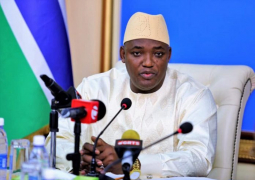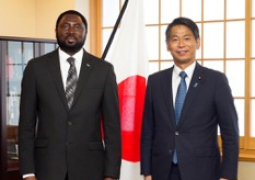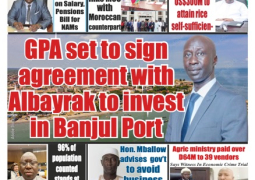
The proceedings began with Lead Counsel Patrick Gomez examining a D2 million cash loan granted to council staff member Nuru Dean. When asked whether the funds were sourced from public resources, Bensouda admitted that the money was transferred in cash but insisted it was entirely financed by his private company, Safaro Trading, a multimillion-dalasi import and distribution business. “It is my private business. I don’t think it is connected to KMC,” he stated, explaining that he occasionally lends money to individuals in need.
However, Counsel Gomez pressed further, noting that Bensouda's dual role as mayor and lender required examination to ensure that no public funds were misused. Chairperson Jainaba Bah reinforced this point, emphasising the Commission’s responsibility to ascertain whether the loan was genuinely private. While Bensouda maintained his stance, he admitted he had no documentary proof since Safaro Trading primarily operated in cash.
The inquiry then shifted to the politically sensitive issue of asset declarations. When asked if he had declared his assets before contesting the 2017 mayoral election, Bensouda initially replied, “I believe so,” but later conceded that he could not recall. He further admitted that he had not submitted any asset declaration after his re-election in 2018.
A significant point of contention was KMC’s continued reliance on the 2009 Financial Manual, which sets spending thresholds for councils. Gomez argued that since the manual was never officially gazetted, it had no legal standing. Bensouda confirmed that it was never formally gazetted but defended its use as a practical guide, given the rigidities of the Local Government Finance and Audit Act of 2004. Chairperson Bah instructed him to present proof that the manual was indeed not gazetted, noting its frequent use by the National Audit Office in reviews.
The Commission also posed questions regarding potential conflicts of interest in KMC’s legal arrangements, particularly the appointment of Mr. Senghor, who was related to a lawyer previously retained by the council. Bensouda admitted he was unaware of the relationship at the time and could not recall who disclosed it, prompting Chairperson Bah to stress that such connections should have been revealed upfront.
Another key focus was the establishment of council-owned companies such as Kanifing Municipal Transport (KMT) and Kanifing Municipal Markets (KMM). Bensouda argued that Section 20 of the Local Government Finance and Audit Act empowered councils to engage in investments. However, he acknowledged that the required ministerial guidelines for such ventures had never been issued and the Ministry of Local Government was not formally consulted before the projects commenced.
Bensouda faced additional questioning regarding KMC’s procurement of waste management trucks from Espace Motors.
Counsel Gomez suggested that the payment arrangement amounted to a loan, as it required installment payments. Bensouda rejected this characterisation, describing it instead as a pre-financing deal:
“If it were a loan, we would have had to provide collateral, which would put government assets at risk.” The dispute intensified over import duties, with Bensouda revealing that the Ministry of Finance unexpectedly denied KMC a duty waiver on the trucks, forcing the council to pay over D13 million in taxes, an expenditure that significantly depleted its accounts.
While Gomez questioned the council’s reliance on waivers after signing supplier contracts that already factored in profit margins, Bensouda insisted that exemptions were a right for public bodies and had always been granted in the past.





